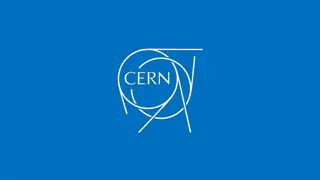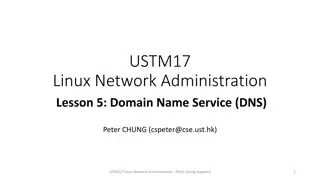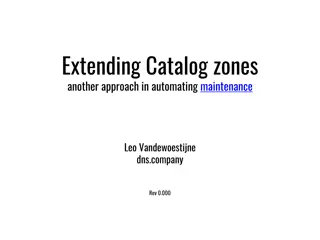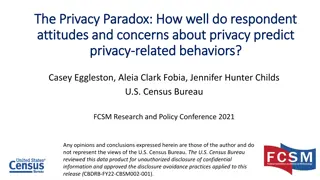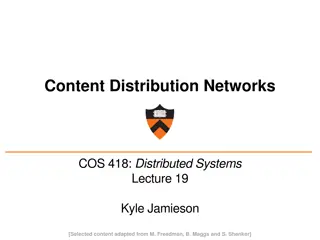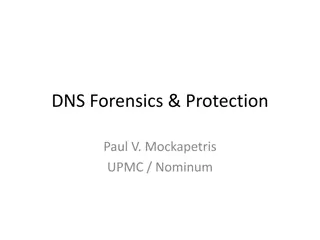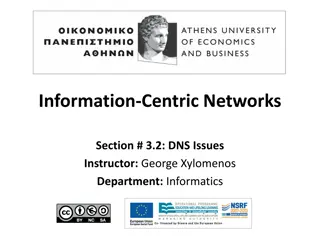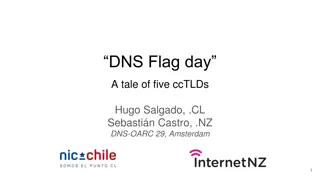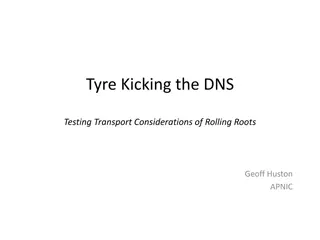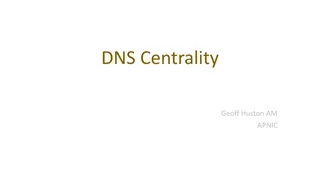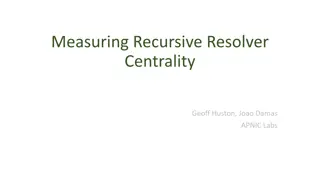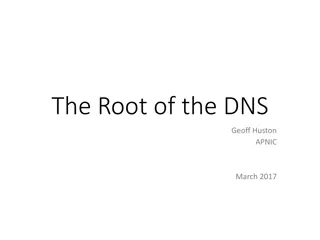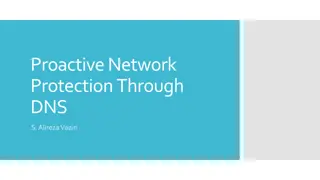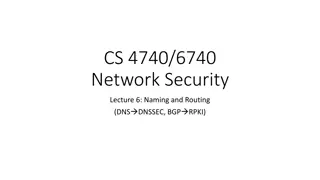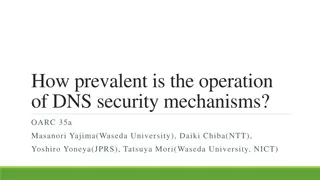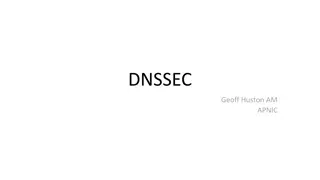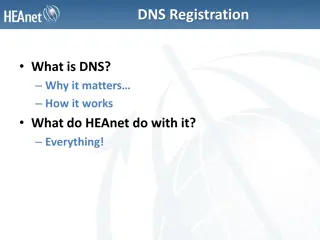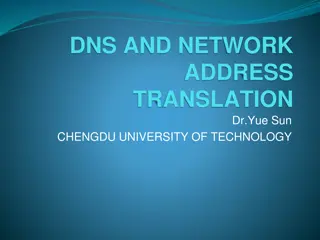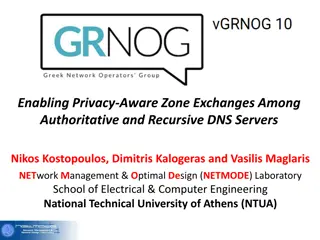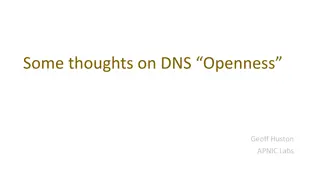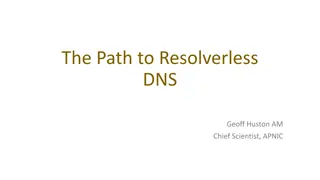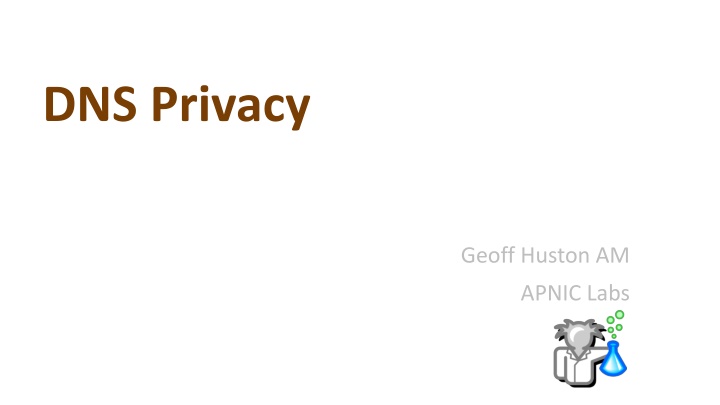
DNS Privacy and Surveillance: Protecting Your Online Activity
Explore the importance of DNS privacy and the risks of DNS surveillance, as well as ways to enhance privacy protection in the online realm. Discover the vulnerabilities of the DNS infrastructure and learn how to safeguard your online activities effectively through insightful analysis and practical solutions.
Download Presentation

Please find below an Image/Link to download the presentation.
The content on the website is provided AS IS for your information and personal use only. It may not be sold, licensed, or shared on other websites without obtaining consent from the author. If you encounter any issues during the download, it is possible that the publisher has removed the file from their server.
You are allowed to download the files provided on this website for personal or commercial use, subject to the condition that they are used lawfully. All files are the property of their respective owners.
The content on the website is provided AS IS for your information and personal use only. It may not be sold, licensed, or shared on other websites without obtaining consent from the author.
E N D
Presentation Transcript
DNS Privacy Geoff Huston AM APNIC Labs
DNS Surveillance The DNS is used by many actors as a means of looking at what we do online and censoring what services we can access online Can we stop DNS surveillance completely? Probably not! Can we make it harder for others to collect individual profiles of activity? Well, yes, we can! And that s what I want to talk about today
How we might think the DNS works Client stub DNS Server DNS Resolver
What we suspect the DNS is like Client Stub DNS Resolver DNS Server DNS Resolver DNS Resolver DNS Resolver DNS Resolver DNS Resolver Resolver DNS Resolver DNS DNS Resolver Resolver DNS Resolver DNS DNS Resolver Resolver DNS
What we suspect the DNS is like Client Stub DNS Resolver DNS Server Servers that leak queries DNS Resolver DNS Resolver Corrupted host platforms DNS Resolver DNS Resolver Wireline and middleware Inspection and interception DNS Resolver Resolver DNS Resolver DNS DNS Resolver Resolver DNS Resolver Resolvers that leak queries DNS DNS Resolver Resolver DNS
Why pick on the DNS? The DNS is very easy to tap Its open and unencrypted DNS traffic is easy to tamper with Its payload is not secured and tampering cannot be detected Its predictable and false answers can be readily inserted The DNS is hard to trace Noone knows exactly where their queries go Noone can know precisely where their answers come from
Second-hand DNS queries are a business opportunity these days
How can we improve DNS Privacy? Lets look at a few behaviours of the DNS and see what we are doing to try and improve its privacy properties
I. The DNS is overly chatty The DNS uses the full query name to discover the identity of the name servers for the query name Hi root server, I want to resolve www.example.com Not me try asking the servers for .com
The DNS is overly chatty The DNS uses the full query name to discover the identity of the name servers for the query name Hi root server, I want to resolve www.example.com Not me try asking the servers for .com Hi .com server, I want to resolve www.example.com Not me try asking the servers for example.com
The DNS is overly chatty The DNS uses the full query name to discover the identity of the name servers for the query name Hi root server, I want to resolve www.example.com Not me try asking the servers for .com Hi .com server, I want to resolve www.example.com Not me try asking the servers for example.com Hi example.com server, I want to resolve www.example.com Sure its 93.184.216.34
The DNS is overly chatty The DNS uses the full query name to discover the identity of the name servers for the query name Why are we telling root servers all our DNS secrets? In our example case, both a root server and a .com server now know that I am attempting to resolve the name www.example.com Maybe I don t want them to know this
The DNS is overly chatty Is there an alternative approach to name server discovery that strips the query name in iterative search for a zone s servers? Yes the extra information was inserted into the query to make the protocol simpler and slightly more efficient in some cases But we can alter query behaviour to only expose as much as is necessary to the folk who need to know in order to answer the query
QNAME Minimisation A resolver technique intended to improve DNS privacy where a DNS resolver no longer sends the entire original query name to the upstream name server Described in RFC 7816
Example of QNAME Minimisation Ask the authoritative server for a zone for the NS records of the next zone: Hi Root server, I want to know the nameservers for com Sure, here are the servers for .com
Example of QNAME Minimisation Ask the authoritative server for a zone for the NS records of the next zone: Hi Root server, I want to know the nameservers for com Sure, here are the servers for .com Hi .com server, I want to know the nameservers for example.com Sure, here are the servers for example.com
Example of QNAME Minimisation Ask the authoritative server for a zone for the NS records of the next zone: Hi Root server, I want to know the nameservers for com Sure, here are the servers for .com Hi .com server, I want to know the nameservers for example.com Sure, here are the servers for example.com Hi example.com server, I want to resolve www.example.com Sure its 93.184.216.34
DNS Privacy Client stub DNS Server DNS Resolver Qname Minimisation 19
II. Interception and Rewriting The DNS is an easy target for the imposition of control over access Try asking for www.thepiratebay.org in Australia Try asking for www.facebook.com in China And on and on and on These days interception systems typically offer an incorrect response How can you tell is the answer that the DNS gives you is the genuine answer or not?
DNSSEC DNSSEC adds additional information into the DNS a digital signature record is added to all RRsets in a zone, signed by the zone controller Any third party who tries to alter a signed zone is unable to generate an authentic signature (as they do not know the zone key value) DNSSEC validation of the signed DNS response can tell you if the response is genuine or if it is out of date or has been altered DNSSEC can t tell you what the good answer is, just that the answer you got was not it! DNSSEC will also tell if is an NXDOMAIN response is authentic
DNSSEC and Recursive Resolvers A DNS response that has been modified will fail to validate. When: a client asks a security-aware resolver to resolve a name, and sets the EDNS(0) DNSSEC OK bit, and the zone is DNSSEC-signed then the recursive resolver will only return a RRset for the query if it can validate the response using the attached digital signature
DNS Privacy Client stub DNS Server DNS Resolver Qname Minimisation DNSSEC Validation 24
III. Wire Tapping and Inspection The DNS is an open (unencrypted) protocol If we want to stop third party inspection we need to encrypt the transport used by DNS queries and responses Today the standard tool is TLS, which uses dynamically generated session keys to encrypt all traffic between two parties We could use TLS between the end client and the client s recursive resolver
DNS over DTLS DTLS is a UDP variant of TLS that is intended to work over UDP rather than TCP (RFC 8094) However: DTLS is intolerant of fragmentation It appears to have similar overheads to TLS I m not sure if there are any robust implementations of DNS over DTLS
DNS over TLS (DoT) TLS is a TCP overlay that adds server authentication and session encryption to TCP TLS uses an initial handshake to allow a client to: Validate the identity of the server Negotiate a session key to be used in all subsequent packets in the TCP session Best used between the stub resolver and its recursive resolver in persistent session mode
DNS over TLS (DoT) The queries and the responses are hidden from intermediaries preventing wiretapping from revealing DNS queries and responses The client can validates the recursive resolver s identity preventing third parties from intercepting DNS queries and generating fake responses
DNS over TLS (DoT) Will generate a higher recursive resolver load as stub client may have a held state with the recursive resolver The TCP session state is on port 853 DNS over TLS can be readily blocked by middleware The privacy is relative, as the recursive resolver still knows all your DNS queries
DOT DOQ DNS TLS TCP IP DNS DNS over QUIC (DoQ) QUIC UDP IP QUIC is a transport protocol originally developed by Google and passed over to the IETF for standardised profile development QUIC uses a thin UDP shim and an encrypted payload The payload is divided into a TCP-like transport header and a payload The essential difference between DOT and DOQ is the deliberate hiding of the transport protocol from network middleware with the use of QUIC
DNS over QUIC DoQ Has much the same benefits as DNS over TLS, but adds the ability to have multiple outstanding queries between the stub and the recursive 31
DNS over HTTPS/2 (DoH) Uses an HTTPS session with a resolver Similar to DNS over TLS, but with HTTP object semantics Uses TCP port 443, so can be masked within other HTTPS traffic Can use DNS wireformat or JSON format DNS payload
DNS over HTTPS/3 (DoH) Uses an HTTPS session with a resolver Similar to DNS over QUIC, but with HTTP object semantics Uses UDP port 443, so can be masked within other HTTPS/3 traffic Can use DNS wireformat or JSON format DNS payload
DNS Privacy Client stub DNS Server DNS Resolver DoT, DoQ, DoH Qname Minimisation DNSSEC Validation 34
DNS within the Browser Firefox s Trusted Recursive Resolver Avoids using the local DNS resolver library and local DNS infrastructure Has the browser sending its DNS queries directly to a trusted resolver over HTTPS Servers available from Cloudflare, Google, Cleanbrowsing
Choose your resolver carefully The careful choice of an open recursive resolver and an encrypted DNS session will go a long way along the path of DNS privacy But the compromise is that you are sharing your activity profile with the recursive resolver operator But this need not be the case
DoH and Push DNS HTTPS allows server push objects as well as pull/get methods This can allow a web page to push a DNS result to the client without the client performing any DNS query at all When used with DNSSEC and Chained Validation responses the client can ensure that the DNS data is valid and current Its fast and very private
Obfusified DNS Use two separate agents in place of a single recursive resolver Use double encryption wrapping The first agent knows the IP identity of the client, but not the DNS query that the client has generated The second agent knows the query, but not the IP identity of the client 38
Obfusified DNS This approach can extremely effective in preserving end user privacy in the DNS This approach has been used in Apple s Private Data Relay service as a way of protecting the user from third party observervation 39
DNS Privacy DNS Obfusication Client stub DNS Server DNS Agent DNS Resolver Qname Minimisation DoQ DoQ DNSSEC Validation 40
EDNS Client Subnet There is a tension between CDN operators that rely on customized DNS responses to perform content steering, and the use of large scale open resolvers that do not necessarily preserve locality The CDN wants to use the assumed location of the DNS resolver to infer the location of the client and direct them to a nearby service instance The result is that the CDN operators want the stub client s IP subnet embedded in the query to ensure that the CDN could provide enhanced content steering for the client by geolocating this subnet
EDNS Client Subnet This has raised a number of concerns about DNS privacy There is a forming consensus that Client Subnet has been a step too far in terms of potential privacy leakage into the DNS
Privacy Tensions in the DNS Exposing the end user s IP location to the DNS leads to better outcomes for content server steering, but compromises user privacy Hiding the end user completely (DoH Push, Obfusified DNS) can lead to pretty comprehensive levels of privacy, and faster DNS operations, but can disrupt content server steering Given that many CDN s are now reliant on DNS-based geolocation, there is current work to use an obscured subnet token value that geo- locates to a similar location, but is unrelated to the end client s IP address / subnet Presumably, we could replace this subnet with a standard geolocator reference, were one defined as an industry standard

